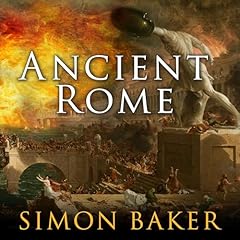
Alaric the Goth
An Outsider's History of the Fall of Rome
No se pudo agregar al carrito
Add to Cart failed.
Error al Agregar a Lista de Deseos.
Error al eliminar de la lista de deseos.
Error al añadir a tu biblioteca
Error al seguir el podcast
Error al dejar de seguir el podcast
Obtén 3 meses por US$0.99 al mes
 Exclusivo para miembros Prime: ¿Nuevo en Audible? Obtén 2 audiolibros gratis con tu prueba.
Exclusivo para miembros Prime: ¿Nuevo en Audible? Obtén 2 audiolibros gratis con tu prueba.
Compra ahora por $17.19
-
Narrado por:
-
Chris MacDonnell
-
De:
-
Douglas Boin
Denied citizenship by the Roman Empire, a soldier named Alaric changed history by unleashing a surprise attack on the capital city of an unjust empire. Stigmatized and relegated to the margins of Roman society, the Goths were violent "barbarians" who destroyed "civilization," at least in the conventional story of Rome's collapse. But a slight shift of perspective brings their history, and ours, shockingly alive.
Alaric grew up near the river border that separated Gothic territory from Roman. He survived a border policy that separated migrant children from their parents, and he was denied benefits he likely expected from military service. In stark contrast to the rising bigotry, intolerance, and zealotry among Romans during Alaric's lifetime, the Goths, as practicing Christians, valued religious pluralism and tolerance.
The marginalized Goths preserved virtues of the ancient world that we take for granted. The three nights of riots Alaric and the Goths brought to the capital struck fear into the hearts of the powerful, but the riots were not without cause. Combining vivid storytelling and historical analysis, Douglas Boin reveals the Goths' complex and fascinating legacy in shaping our world.
©2020 Douglas Boin (P)2020 HighBridge, a division of Recorded BooksLos oyentes también disfrutaron:




















Las personas que vieron esto también vieron:


















I most enjoyed the way the author re-contextualized the popular perception of the Goths, they were not marauding, German raiders, but closer to wandering Romanian refugees. They were stuck in an untenable position between raiding tribes from the north and the powerful, exploitive and increasingly xenophobic Roman Empire to the South. Overall, a nice focused history on a subject I did not know much about prior to listening to this.
Nice short book that tries to upend the story of Alaric
Se ha producido un error. Vuelve a intentarlo dentro de unos minutos.
great story told from a different perspective
Se ha producido un error. Vuelve a intentarlo dentro de unos minutos.
The Life and Times of Alaric
Se ha producido un error. Vuelve a intentarlo dentro de unos minutos.
Ancient History Through the Lens of Current Politcal and Social Thinking
Se ha producido un error. Vuelve a intentarlo dentro de unos minutos.
Sweep of Romanitas
Se ha producido un error. Vuelve a intentarlo dentro de unos minutos.
I highly recommend it. the author adds well researched takes on issues and events I believe we previously misrepresented.
I enjoyed it
lots of good history!!
Se ha producido un error. Vuelve a intentarlo dentro de unos minutos.
Wonderful Read
Se ha producido un error. Vuelve a intentarlo dentro de unos minutos.
The fall of Rome-The rest of the story
Se ha producido un error. Vuelve a intentarlo dentro de unos minutos.
More a discussion of an era
Se ha producido un error. Vuelve a intentarlo dentro de unos minutos.
Fascinating take on Roman Times
Se ha producido un error. Vuelve a intentarlo dentro de unos minutos.



